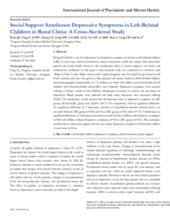Abstract
Being left-behind is one of explanations for depressive symptom occurrence in left-behind children (LBC) in rural areas. Social environment, school, community could also impact their personality growth and mental health. However, the amelioration effect of social support is not clearly and substantively confirmed. In this paper a cross-sectional study was conducted in a common rural village in China. In this village various social support programs were developed by government at all levels. Concern and care were given to their physical and mental health of all left-behind children. Social-demographic characteristics of 173 children, of which 104 children were left-behind and 69 children were Non-left-behind (Non-LBC), were collected. Depressive symptoms were assessed utilizing a Chinese version of the Children’s Depression Inventory to measure the prevalence of depression. Blood samples were collected and three stress hormones were measured utilizing ELISA. The preliminary results showed that the detection rates of depressive symptoms in LBC group and Non-LBC group were 28.85% and 21.74% respectively, with no significant difference. No significant difference of 3 hormones secretion of hypothalamic-pituitary-adrenal cortex axis occurred between LBC group (n=104) and Non-LBC group (n=69) (total n=173). Furthermore no significant difference of 3 hormones secretion occurred between children with depressive symptoms (n=30) and children without depressive symptoms (n=74) in LBC group (n=104). The conclusion could be drawn that social support and care may refrain depressive symptoms in left-behind children in rural areas in China.

